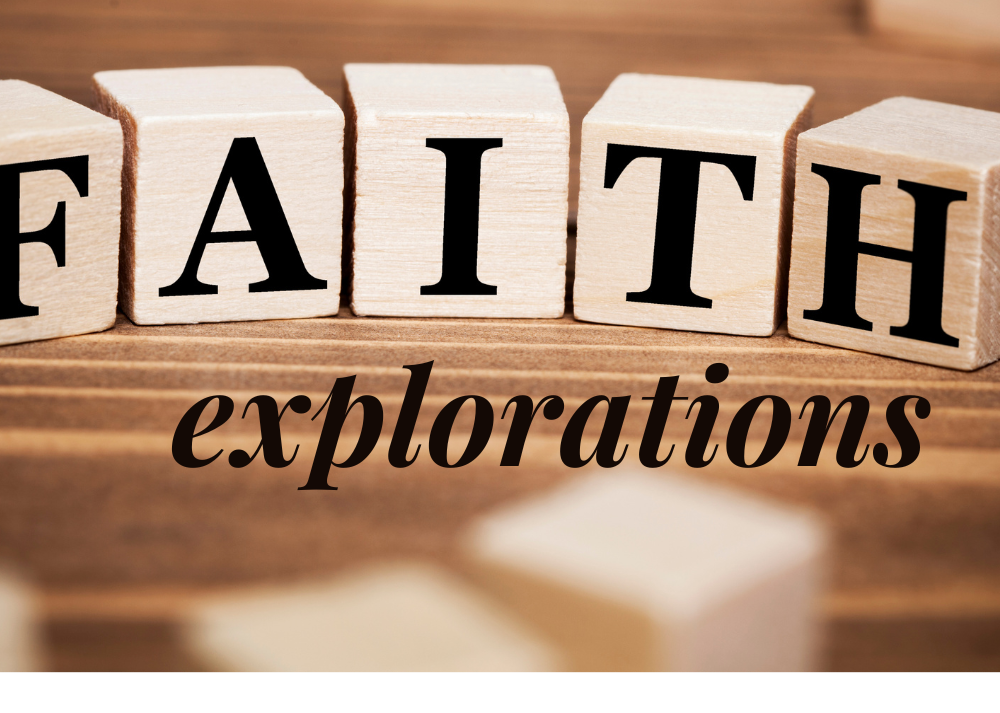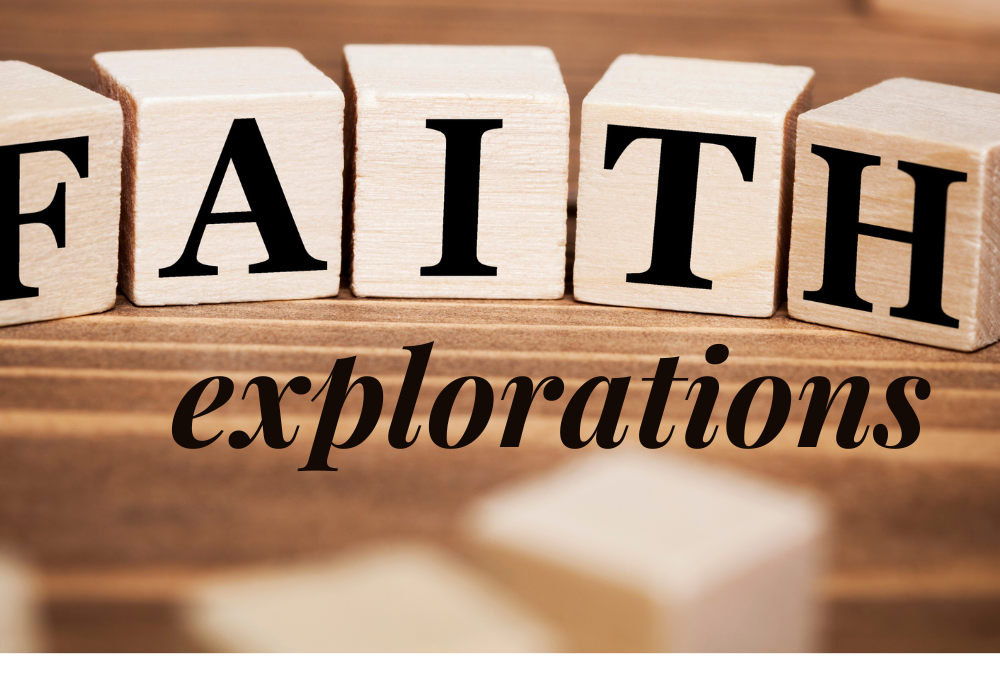
Today’s Sermon focus
What’s our role again?
I think anyone who has ever owned a cat will have serious questions about what’s meant by “dominion” in the Genesis reading.
In Genesis, God tells his newly formed people, “Be fruitful and multiply, and fill the earth and subdue it; and have dominion over the fish of the sea and over the birds of the air and over every living thing that moves upon the earth.” So, let me ask the cat owners, who here has a cat over which you feel you have dominion?
Even for dogs, dominion is a strange word. Can you have dominion over an animal that does everything you say because it just wants to please you and have treats?
An animal that adores you and celebrates you every time you walk in the door? That sounds more like mutuality of love and love of food. Both great things, but I don’t think that sounds like dominion.
Dominion in this text also doesn’t make sense when we think about God. God makes the world in six days according to Genesis. At the end of each day, starting with even the first day with the creation of light, God admires and loves creation, saying how wonderful, how deeply good creation is. Day after day, God says creation is good and very good. The Hebrew word for good is tov and it means good, but in an elemental, deep-to-the-bones kind of goodness. So, dominion, as we would understand that word – subjugation, control, cruelty – that too doesn’t really fit with the tov creation of a loving God.
So, when people are given this deeply good planet to have dominion over in Genesis, what do we think God is saying? What is God saying about how we fit in to creation or how we should relate to the planet and the animals God made together with humans on the sixth day?
BTW, We didn’t get out own day of creation. Light did. The Sabbath did. We did not.
So, how do we treat these animals who share our evolutionary history and our day of creation? Animals who breathe the same air, drink the same water, and also get annoyed with black flies like I do? Afterall, our human genes are 60% identical to both fruit flies and bananas.
We are of this earth, made of this earth, woven into the fabric of our home. So, what does dominion mean in this context?
There’s no getting around that subdue and dominion are challenging words.
However, in the Hebrew Bible the most common metaphor for a king is a shepherd. The one who rules and has dominion is metaphorically a shepherd, whose job is to ensure the health and safety of the flock.
The shepherd is also one whose own wellbeing is interdependent with the health of the flock. So, dominion, as God says it, does not mean what we think it means. To rule or have dominion as a shepherd is to lead for the sake of the flock. This is a very different thing from what dominion means to our modern ears. Similarly, subdue in Hebrew can also be translated as making a path, making a way in the world. So how does the text change for us when we consider these words?
“Be fruitful and multiply, and fill the earth and make your home here; and shepherd and steward the fish of the sea and the birds of the air and every living thing that moves upon the earth.”
How different does this feel to you than the usual reading we’ve heard this morning? Does this sound more like a God of promise for the wellbeing of all? Does this sound more like your relationship with your beloved animals here today or at home? Or the pets of your childhood?
God tells us to subdue and have dominion, but how we understand those words has impact in our lives.
I read a New York Times opinion essay this week titled, “Teenagers Are Telling Us that Something is Wrong with America.” It’s written by a psychologist who works with youth in New York and in his essay, he tells us what they are saying. These kids say they are nervous there’s no real future for them. Or they don’t necessarily want the life their parents have, because their parents look miserable even as they push them to achieve their same life. One teen said something like, “Don’t get attached to anything. It’s all going to change anyway.”
The author acknowledges teenage angst is developmental as the push against what they are given in life, but he ends the article by saying, “Truth be told, we all have these questions about how precarious life has to be in this country, how to live with the hopelessness about the future that is emerging and how all of this is coming up against the pursuit of self and freedom so celebrated in America.”
He names a groundlessness in our society that a lot of people are feeling, maybe most poignantly teenagers and young adults.
So, here we have two ways of seeing our world. One way is God’s deeply good creation that is our inheritance. The other way is a world of our making; our culture, our rules of how life works and our children are dubious about the goodness of our creation. There is a loss of hope in our society where we do have dominion and yet in God’s creation, hope is abounding.
Could it be that we have forgotten how we already are woven into God’s creation? Are we hustling to subdue and have dominion over our fears and anxieties of never having enough security or control?
If we believe first and foremost in the reality of a dog-eat-dog world, having dominion in the world as a shepherd makes no sense. And yet this is God’s invitation.
This is Jesus’ ministry that we are here today to share in and give thanks for. God gives us this role of shepherd as our first and maybe only real task in life. So, perhaps our assumptions of scarcity in our lives and the feeling of never having or being enough are not as true as God’s promises of a good creation and life for us.
And so, I think of our gospel today about an insistent woman asking for justice. Could it be that our teenagers and others who are feeling disenfranchised by our normal, daily life have something to tell us that we should listen to? What if we listen to these children’s voices? Or even the rumblings in our own hearts that whisper of a better world?
Perhaps Jesus and our holy Creator are there already in those voices of questioning; already there with real hope and grace for a good future that is unfolding now for us.
Thankfully our way of life, including all the good and the bad, rests in God’s creation which is already and always full of promise and love for all of us, human and nonhuman alike. We have each other, we have Jesus, and we have the creation story in Genesis to remind us of our deeply good world in which we live and already belong. Each of us already belong here, down to our DNA and our toes. We have the invitation to make our home here among our creaturely kin for whom we can be shepherds.
I wonder if this is part of the reason we love our animals so and we delight in taking care of them. We get to be as shepherds to them. And in this way we are participating in God’s invitation to us to live in service to others of all kinds and species.
Today we gather to bless these animals and give thanks for them in all the many ways they bless us. We give thanks to our generous Creator God for the opportunity to be the shepherd, to be the steward to our beloved pets, our families, ourselves, and ultimately all of Creation.
We give thanks for all the ways God shows us how to love more fully from our shepherds and teachers who are in the form of our blessed animals here today.
They remind us of God’s eternal and bountiful promises to us that are bigger than ourselves and for that we give thanks and praise.
AMEN
Gospel Reading – Luke 18:1-8
18Then Jesus told them a parable about their need to pray always and not to lose heart. 2He said, “In a certain city there was a judge who neither feared God nor had respect for people. 3In that city there was a widow who kept coming to him and saying, ‘Grant me justice against my opponent.’ 4For a while he refused; but later he said to himself, ‘Though I have no fear of God and no respect for anyone, 5yet because this widow keeps bothering me, I will grant her justice, so that she may not wear me out by continually coming.’” 6And the Lord said, “Listen to what the unjust judge says. 7And will not God grant justice to his chosen ones who cry to him day and night? Will he delay long in helping them? 8I tell you, he will quickly grant justice to them. And yet, when the Son of Man comes, will he find faith on earth?”
Service Recording
Sermon at 21:30
Questions to consider:
- What do you think about the article and the idea that the youth of today are nervous about the world they are inheriting? Do you think this is a unique time?
- Do you have a deep sense of belonging as a creature and human on this planet? What do you think gets in the way of that?
- Everyone has heard about Original Sin, right? Have you heard about this idea that creation was considered deeply good from the beginning? That includes humans and therefore you. How does that impact you?
Links
New York Times Opinion Piece – “Teenages are Telling Us Something is Wrong with America”
Dr. Webster is a clinical psychologist and psychoanalyst.
Join Our Email List
We email prayer requests to the community, along with worship bulletins for online worship, updates on special events, and the monthly newsletter. In general, you can expect about 3-4 emails a week from Celebration Lutheran.

0 Comments